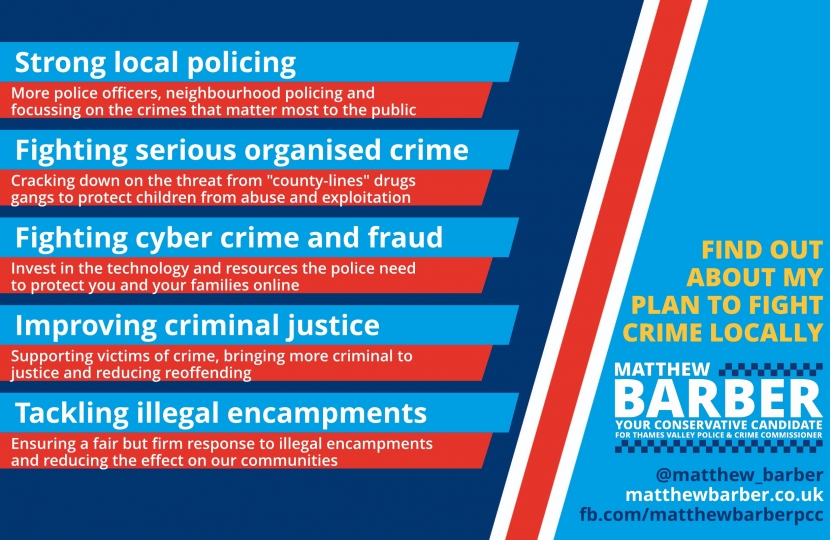
Reducing crime, keeping people safe, and delivering justice for victims. Policing can make a real difference in all of our communities and I want to ensure that your voice is heard in the priorities that Thames Valley Police have. The choice you make at these elections really matters. The next Police & Crime Commissioner will have to manage nearly half a billion pounds of police funding, hold the Chief Constable to account for improving performance and give voice to the concerns of residents from across the Thames Valley.
As your PCC I will work constructively to get the best deal from the Government, to deliver the resources, powers and protections that our brave police officers need. I will ensure that Thames Valley Police is properly equipped to address the concerns of the public; recruiting more police officers and PCSOs; improving response times and driving down crime.
Above all communities across Thames Valley want to see strong local policing. That means more visibility in our communities, continuing to drive down burglaries, robberies and vehicle crime as well as dealing with the complex problems of domestic abuse and drug related crime.
Every community in Oxfordshire, Berkshire, Buckinghamshire and Milton Keynes deserves the best from Thames Valley Police and if elected on 6th May I will implement my plans to improve road safety and reduce speeding, fight rural crime, tackle illegal encampments, and work with the prisons and probation to reduce reoffending.
My aim is to ensure Thames Valley Police are their best to protect you, your family and your property.
 The Thames Valley should be a hostile environment for criminals. Over recent years with tightening resources Thames Valley Police have done an incredible job of keeping crime low. Behind some of the national newspaper headlines lies the truth that many aspects of violent and acquisitive crime remain historically low, but that does not mean there are not significant challenges to be faced. The role of the police is changing. No longer are the police simply the thin blue line of law and order. There is now a wider role in community safety and protection for the public.
The Thames Valley should be a hostile environment for criminals. Over recent years with tightening resources Thames Valley Police have done an incredible job of keeping crime low. Behind some of the national newspaper headlines lies the truth that many aspects of violent and acquisitive crime remain historically low, but that does not mean there are not significant challenges to be faced. The role of the police is changing. No longer are the police simply the thin blue line of law and order. There is now a wider role in community safety and protection for the public.
The vital ingredients for an effective police force are not just people and resources but also public confidence. Police & Crime Commissioners can help to enhance that confidence by acting as the link between the public and those who protect them.
I am seeking your support to become Thames Valley PCC in 2021 because I believe that together we can deliver an effective and efficient police force to drive down crime even further. With your support we can make Thames Valley an even better place to work, do business and raise a family.
Click here to view the full copy of my draft Police & Criminal Justice Plan.
These are my proposals for the next Police and Criminal Justice Plan for the Thames Valley. As the Conservative candidate in the 2021 Police & Crime Commissioner elections I am setting out my vision for policing in Berkshire, Buckinghamshire and Oxfordshire.
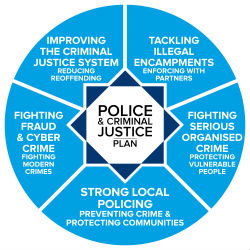 Throughout the document I set out clear objectives that, as PCC, I will hold the Chief Constable accountable for delivering. Setting out a Police and Criminal Justice Plan is not an exhaustive process, but it does set the strategic priorities and the focus for the effort of the Force in the years to come. These priorities make clear the key areas for future work and the endeavour to bring clearer accountability and to focus on the outcomes for the public. I have not met a single police officer who does not understand the need for the police to be scrutinised and held to high standards. In return they expect strong leadership, both from their senior officers and the PCC, and a clear vision of what is expected. Officers in the Thames Valley place themselves in harms way every day in order to keep the public safe and uphold the law. They deserve the
respect of politicians and the public for their work. My vision for policing, set out in this
plan, is for a clear focus on the priorities that matter the most to the public; police officers
being empowered to make decisions to protect the public they serve and to remember
that the police are only the public in uniform. If we work together, public and the police,
councils and the community, law enforcement and the judiciary, we can make the
Thames Valley an even better and safer place to live for everyone.
Throughout the document I set out clear objectives that, as PCC, I will hold the Chief Constable accountable for delivering. Setting out a Police and Criminal Justice Plan is not an exhaustive process, but it does set the strategic priorities and the focus for the effort of the Force in the years to come. These priorities make clear the key areas for future work and the endeavour to bring clearer accountability and to focus on the outcomes for the public. I have not met a single police officer who does not understand the need for the police to be scrutinised and held to high standards. In return they expect strong leadership, both from their senior officers and the PCC, and a clear vision of what is expected. Officers in the Thames Valley place themselves in harms way every day in order to keep the public safe and uphold the law. They deserve the
respect of politicians and the public for their work. My vision for policing, set out in this
plan, is for a clear focus on the priorities that matter the most to the public; police officers
being empowered to make decisions to protect the public they serve and to remember
that the police are only the public in uniform. If we work together, public and the police,
councils and the community, law enforcement and the judiciary, we can make the
Thames Valley an even better and safer place to live for everyone.
You can have your say on crime in the Thames Valley and on my priorities, set out below, by clicking here to take part in my policing survey.
Strong local policing
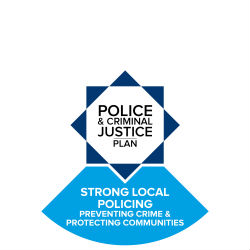 Recruiting more police officers, protecting local neighbourhood policing and focussing on driving down burglary & rural crime.
Recruiting more police officers, protecting local neighbourhood policing and focussing on driving down burglary & rural crime.
Neighbourhood policing is the bedrock of law enforcement in the UK. New and emerging threats such as terrorism and high-tech crime rightly have created specialisms which are vital to protect the public in the modern world, but the significance of effective, visible, local policing cannot be overlooked. Even in the areas of counter-terrorism and serious organised crime it is often neighbourhood police officers and police community support officers (PCSOs) that gather the vital intelligence or who are the first on the scene of an incident. We all know that the public not only expect to see police officers, but that they feel safer when they do. This is level of trust and the confidence the police can give to communities is hugely valuable and their trust should be repaid.
Each one of our communities should expect and receive the same highest standards of policing that Thames Valley can provided. Whether it is our city centres where the concern of residents may be the nightime economy or isolated rural communities that may face vandalism and theft, the police response should always be proportionate, appropriate and understand the impact such incidents have on victims.
The purpose of prioritising local policing goes beyond just visibility. With the victim always at the heart of what we do, we must continue to drive down traditional acquisitive crime and reduce the fear of violence in all parts of Thames Valley.
Neighbourhood policing is at the heart of this model and will be protected. Locally based CID must improve the quality of investigations and communications with victims and witnesses needs to improve to ensure that the public can contact the police easily and that they are kept up to date with the crimes that are affecting them.
Other issues such as speeding traffic also cause great concern in our communities but it is recognised that many of these cannot be solved by the police alone. Engaging with partnership organisations and community groups will provide the key to addressing the concerns of the public and allowing frontline police officers focus on fighting crime.
Fighting serious and organised crime
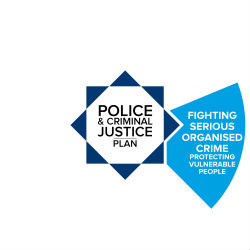 Cracking down on the threat from “county lines” drugs gangs to protect children from exploitation and abuse.
Cracking down on the threat from “county lines” drugs gangs to protect children from exploitation and abuse.
Serious organised crime often seems like a distant threat to many members of the public. Sadly, the effects of gangs and serious organised crime groups can often be seen in local communities. Whether it is the drug trade, serious violence, people trafficking or sexual abuse, some of the most vulnerable members of our society often become the victims of serious organised crime.
It can take many forms and Thames Valley already take a regional lead through the South East Regional Organised Crime Unit (SEROCU). Throughout this Police & Criminal Justice Plan the importance of strong neighbourhood policing is emphasised and once again these crime gangs are not purely the remit of specialist officers, but also need to be tackled through strong local intelligence and action.
Sufficient resource needs to be dedicated to tackling these organised crime groups and ensure effective local and regional policing. Technology plays a role as does collaboration with security and intelligence agencies and other police forces. Protection of the public is key and this priority covers those threats that may harm any of us indiscriminately such as terrorism as a well as those that are specifically targeted such as victims of child abuse and exploitation.
The Force will continue to lead the way in tactics and techniques to tackle these gangs. As well as seeking to bring those responsible to justice through the courts, tactics will be employed to disrupt their activities, especially when this will safeguard the most vulnerable.
In tackling the exploitation of vulnerable adults and children we will not lose sight of the high levels of acquisitive and environmental crime that is also perpetrated by serious organised crime groups. Additional resources invested in this area will have an impact in reducing many of the crimes that the concern the public most in their communities.
Fighting cyber crime and fraud
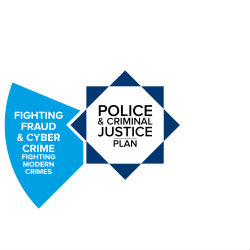 Crime is changing and I will invest in the technology and resources the police need to protect the public online.
Crime is changing and I will invest in the technology and resources the police need to protect the public online.
Whilst traditional acquisitive crime such as burglary (see Strong Local Policing) remains one of the public’s greatest concern, and undoubtedly can have a huge impact on victims, a new and arguably greater risk is emerging.
We are all much more likely to be victims of cyber crime, often without even realising it, than we are to be a victim of a ‘traditional’ crime. Fraud and cyber crime covers a wide variety of offences, from corporate fraud within the banking industry that may stretch into billions of pounds, to scam emails the may seek to take just a few pence from a large number of accounts.
Investigating these crimes and bringing people to justice is incredibly complex. Law enforcement agencies across the UK need to significantly improve performance on dealing with these issues domestically let alone the challenge of need to tackling these offences of a global scale.
At a national level I will continue to work with Government, national and regional law enforcement agencies for a more effective and joined up system for dealing with these complex threats.
At a local level will continue to be proactive in educating the public and embracing the specialist technology and expertise necessary to pursue high-tech criminals.
Working through the existing regional structures, developing new collaborations and enhancing the Force's own capability we will enhance Thames Valley's ability to protect the public from both cyber and cyber-enabled crime.
Dealing with cyber is no longer just a specialism, but almost every incident of crime could have some digital footprint. Ensuring that the Force has in place the resources, training and structures to ensure investigations can remain effective in a digital age is vital to maintaining public confidence and fighting crime across the board.
Improving the criminal justice system
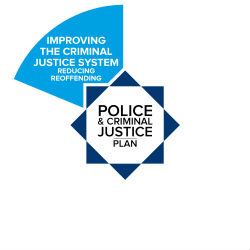 Supporting victims of crime, bringing more criminals to justice and reducing reoffending.
Supporting victims of crime, bringing more criminals to justice and reducing reoffending.
The public want to see criminals brought to justice, yet the police can rightly only be involved in part of that process. Prevention and detection is the role for Thames Valley Police but there must always be a level of independence from other areas of the criminal justice system.
Police & Crime Commissioners have a wider remit and this is likely to grow further into other areas of the criminal justice system. Through vehicles such as the Local Criminal Justice Board the PCC can exert influence (although not authority) over other partners. Devolution of powers and budgets in other areas could see this role expand as PCCs are uniquely placed to be both publicly accountable and yet have the convening power across all areas of criminal justice.
Much work will still focus on policing, especially ensuring that evidence is gathered efficiently and effectively to ensure the Crown Prosecution Service are able to prosecute cases effectively. Yet a greater focus needs to be placed on getting cases through the courts successfully, improving access to courts even if that is through the use of technology and particularly around reducing reoffending.
The PCC will continue to provide support services for victims of crime through our own Victims First service and will continue to support the voluntary sector working both with victims and the rehabilitation of offenders.
Supporting innovation will be key, as Thames Valley has already demonstrated, for example in the use of GPS tagging of offenders and fast-tracking cases of domestic abuse through the courts.
Ultimately delivering a fair system of justice that provide justice for victims, protection of the innocent and stops criminals from reoffending must be our goal.
Tackling illegal encampments
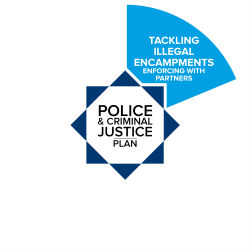 Ensuring a fair but firm response to illegal encampments and reducing the effect on our communities.
Ensuring a fair but firm response to illegal encampments and reducing the effect on our communities.
At the peak of the season illegal encampments can be a significant concern for residents across the Thames Valley. Currently the initial trespass is rarely a police matter, but this is often accompanied by reports of anti-social behaviour, criminal damage, theft and intimidation.
Everyone should be treated equally before the law. There are undoubtedly individuals within the Gypsy, Roma and Traveller (GRT) community who consider themselves above the law but equally the many law-abiding members of those nomadic communities should expect the same protection by the police as permanent residents. This is often seen as a conflict, with static communities either feeling the authorities turn a blind eye, or GRT communities feeling victimised.
The answer is a “firm but fair” approach that has buy-in from representatives of the GRT communities and local authorities. Tackling the criminal elements within GRT communities and making them unwelcome in the Thames Valley is to the benefit of both permanent residents, but also the law-abiding majority of travellers who are all too often victimised because of their background.
There needs to be a redoubling the efforts of partnership working with local authorities and landowners to met the expectation of swift action. Local police areas need to be empowered to take action swiftly to tackle illegal encampments and associated criminality. At the same time local authorities should be proactive in meeting the requirements of the law-abiding GRT community and all partners including the police will need to work with communities to tackle prejudice and discrimination.
Having campaigned for a change in the law, which is now being progressed by the Government I will continue to engage with politicians locally and nationally to ensure we strike the right balance and give the police the right powers to tackle the issue.










